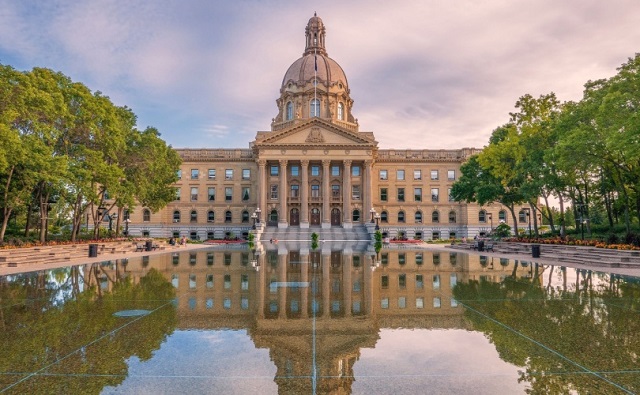Alberta
Alberta bill in the works protects healthcare workers, hospices from having to offer euthanasia

From LifeSiteNews
Alberta Premier Danielle Smith, the leader of the UCP, had earlier promised that the province’s Bill of Rights would be amended this fall to add protections for people’s personal medical decisions that most likely will include the right to refuse a vaccine.
A piece of provincial legislation that would enact a new Alberta “Bill of Rights” includes a section ensuring all provincial healthcare workers along with hospices have the right to refuse to be complicit in offering euthanasia to patients.
LifeSiteNews was recently provided exclusive access to a draft version of the “Alberta Bill of Rights” from a source well connected with the ruling United Conservative Party (UCP).
The provisions protecting healthcare workers from being forced to participate in state-sanctioned medical assistance in dying, or MAiD as it is known, is written under a section called “Freedom of informed consent and to make personal health decisions, including to refuse vaccinations, medical or surgical procedures.”
“Individuals’ healthcare personal choices and safety are further secured by the separation of health care and death care,” the draft text states.
“Whereas: individual healthcare workers and private hospice facilities have the rights to freedom of conscience when deciding whether to recommend or participate in prescribing or providing medical assistance in dying.”
It is expected that the UCP government in Alberta will introduce its new “Bill of Rights” this fall. The draft of the bill contains a slew of pro-freedom proposals, including, as reported by LifeSiteNews, enshrining the “right to life” into law, including from “conception, gestation in the womb.” It also includes, as reported by LifeSiteNews, a section that guarantees each citizen has the “right” to medical “informed consent” as well as the “right” to “refuse vaccinations.”
The UCP source told LifeSiteNews that the draft version of the bill is subject to change. However, the hope from those who worked on it is that the definitive version will not include many changes.
Alberta Premier Danielle Smith, the leader of the UCP, had earlier promised that the province’s Bill of Rights would be amended this fall to add protections for people’s personal medical decisions that most likely will include the right to refuse a vaccine. Her exact position on MAiD is not clear, but she appears to support healthcare workers’ right to freedom of conscience.
The draft version of the Alberta Bill of Rights was created by a “small group writing it in secret and consulting with lawyers” as well as elected MLAs and cabinet members of the UCP government, according to the source within the UCP.
When it comes to MAiD, Prime Minister Justin Trudeau’s government sought to expand it from the chronically and terminally ill to those suffering solely from mental illness.
However, in February, after pushback from pro-life, medical, and mental health groups as well as most of Canada’s provinces, the federal government delayed the mental illness expansion until 2027.
The number of Canadians killed by lethal injection since 2016 stands at close to 65,000, with an estimated 16,000 deaths in 2023 alone. Many fear that because the official statistics are manipulated the number may be even higher.
Alberta
Premier Danielle Smith responds to election of Liberal government

Premier Danielle Smith released the following statement following the re-election of a Liberal government in Ottawa.
I congratulate Prime Minister Mark Carney on his minority government election victory last night.
I also want to sincerely thank Pierre Poilievre for his powerful and principled advocacy against the last decade’s punitive taxation and anti-resource policies that have made our country weaker, more divided and overly-dependent on the United States.
Mr. Poilievre’s vision for a safer, more affordable, united and prosperous Canada drove the policy debate in this country for the last several years and has inspired millions to see the unique potential of our nation. While Liberals and New Democrats demeaned and demonized Albertans, our values and our industries for political gain, Mr. Poilievre made empowering Albertans and our energy sector a cornerstone of his campaign. His respect and admiration for Albertans could not have been clearer. He is and continues to be a true friend of Alberta.
As Premier, I invite the Prime Minister to immediately commence working with our government to reset the relationship between Ottawa and Alberta with meaningful action rather than hollow rhetoric. A large majority of Albertans are deeply frustrated that the same government that overtly attacked our provincial economy almost unabated for the past 10 years has been returned to government.
As Premier, I will not permit the status quo to continue. Albertans are proud Canadians that want this nation to be strong, prosperous, and united, but we will no longer tolerate having our industries threatened and our resources landlocked by Ottawa.
In the weeks and months ahead, Albertans will have an opportunity to discuss our province’s future, assess various options for strengthening and protecting our province against future hostile acts from Ottawa, and to ultimately choose a path forward.
As Premier, I will facilitate and lead this discussion and process with the sincere hope of securing a prosperous future for our province within a united Canada that respects our province’s constitutional rights, facilitates rather than blocks the development and export of our abundant resources, and treats us as a valued and respected partner within confederation.
Our government will be holding a special caucus meeting this Friday to discuss this matter further. I will have more to say after that meeting is concluded.
Alberta
Low oil prices could have big consequences for Alberta’s finances

From the Fraser Institute
By Tegan Hill
Amid the tariff war, the price of West Texas Intermediate oil—a common benchmark—recently dropped below US$60 per barrel. Given every $1 drop in oil prices is an estimated $750 million hit to provincial revenues, if oil prices remain low for long, there could be big implications for Alberta’s budget.
The Smith government already projects a $5.2 billion budget deficit in 2025/26 with continued deficits over the following two years. This year’s deficit is based on oil prices averaging US$68.00 per barrel. While the budget does include a $4 billion “contingency” for unforeseen events, given the economic and fiscal impact of Trump’s tariffs, it could quickly be eaten up.
Budget deficits come with costs for Albertans, who will already pay a projected $600 each in provincial government debt interest in 2025/26. That’s money that could have gone towards health care and education, or even tax relief.
Unfortunately, this is all part of the resource revenue rollercoaster that’s are all too familiar to Albertans.
Resource revenue (including oil and gas royalties) is inherently volatile. In the last 10 years alone, it has been as high as $25.2 billion in 2022/23 and as low as $2.8 billion in 2015/16. The provincial government typically enjoys budget surpluses—and increases government spending—when oil prices and resource revenue is relatively high, but is thrown into deficits when resource revenues inevitably fall.
Fortunately, the Smith government can mitigate this volatility.
The key is limiting the level of resource revenue included in the budget to a set stable amount. Any resource revenue above that stable amount is automatically saved in a rainy-day fund to be withdrawn to maintain that stable amount in the budget during years of relatively low resource revenue. The logic is simple: save during the good times so you can weather the storm during bad times.
Indeed, if the Smith government had created a rainy-day account in 2023, for example, it could have already built up a sizeable fund to help stabilize the budget when resource revenue declines. While the Smith government has deposited some money in the Heritage Fund in recent years, it has not created a dedicated rainy-day account or introduced a similar mechanism to help stabilize provincial finances.
Limiting the amount of resource revenue in the budget, particularly during times of relatively high resource revenue, also tempers demand for higher spending, which is only fiscally sustainable with permanently high resource revenues. In other words, if the government creates a rainy-day account, spending would become more closely align with stable ongoing levels of revenue.
And it’s not too late. To end the boom-bust cycle and finally help stabilize provincial finances, the Smith government should create a rainy-day account.
-

 2025 Federal Election2 days ago
2025 Federal Election2 days agoNine Dead After SUV Plows Into Vancouver Festival Crowd, Raising Election-Eve Concerns Over Public Safety
-

 2025 Federal Election2 days ago
2025 Federal Election2 days agoMark Carney: Our Number-One Alberta Separatist
-

 2025 Federal Election2 days ago
2025 Federal Election2 days agoColumnist warns Carney Liberals will consider a home equity tax on primary residences
-

 International2 days ago
International2 days agoJeffrey Epstein accuser Virginia Giuffre reportedly dies by suicide
-

 2025 Federal Election2 days ago
2025 Federal Election2 days agoCanada is squandering the greatest oil opportunity on Earth
-

 International1 day ago
International1 day agoU.S. Army names new long-range hypersonic weapon ‘Dark Eagle’
-

 Autism23 hours ago
Autism23 hours agoUK plans to test children with gender confusion for autism
-

 COVID-1922 hours ago
COVID-1922 hours agoFormer Australian state premier accused of lying about justification for COVID lockdowns
